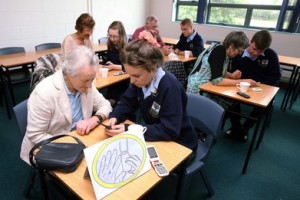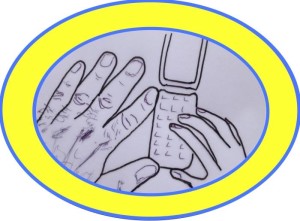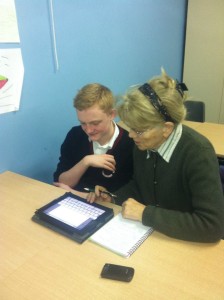
By Ann Marie Foley - 03 March, 2015
 Teenagers are training older generations in the use of mobile phones and other electronic devices at 30 schools throughout Ireland.
Teenagers are training older generations in the use of mobile phones and other electronic devices at 30 schools throughout Ireland.
That is a doubling of venues for the popular 121digital training, and the Department of Communications, Energy and Natural Resources now gives support and accreditation and some financial assistance.
The programme also passed the milestone of having trained 1,000 people during the year.
This has been made possible by the voluntary effort of secondary school Transition Year (TY) students and their parents and mentors who help organise the one to one training.
The course organiser, Fintan Mulligan, now wants to train people at night as well as during school hours.
He cites recent a report from Europe on the Irish economy which asserted that Irish people’s digital literacy is very low.
It also highlights that 42% of the Irish workforce stated that they had ‘little or no digital skills’.
“There is a huge group of people who are still in the workforce and who need help but who cannot come during the day,” he told CatholicIreland.net.
“I am trying to find a group of potential tutors who would teach in the evening time. Youth clubs are a possibility.”
 Five years ago Fintan Mulligan set up 121 digital with the idea that young people have tremendous digital skills which they can pass on to the 40+ age group who missed out on the digital age.
Five years ago Fintan Mulligan set up 121 digital with the idea that young people have tremendous digital skills which they can pass on to the 40+ age group who missed out on the digital age.
The young people get show off their skills and mix with adults who in turn gain the necessary skills to access the internet, government and other services, and stay in contact with loved ones at home and abroad.
It is a practical service, but 121digital organisers state is also a community building programme which challenges and rewards the students who volunteer their time and skill to teach a local adult.
School principals and TY co-ordinators have stated that the TY volunteer tutors mature through the experience.
Up to 15 learners come together with 15 tutors in one classroom for training.
“The one to oneness of what they do is the winner, because all the learners are at different speeds. Also they can miss a lesson and if training was delivered by one trainer they might not catch up,” said Fintan Mulligan who explained that the training is personal and done in a friendly atmosphere.
“Everyone volunteers and they love what they are doing and they are excited by it,” he said.

There are now 30 schools involved in counties including Wicklow, Kerry, Cork, Kildare, Meath, Westmeath, and Roscommon among others.
Fintan Mulligan would like to see a lot more schools involved to spread its very real benefits far and wide and to help prevent isolation which can come from being unable to use digital means of communication.
When he started the demand was to learn how to use mobile phones but this has changed to include smart phones and other devices.
“More so than last year, this year they want to know all about the internet on whatever device, whether it is on the smart phone, laptop or tablet, because when they want to know about a service all they hear is ‘look on our website’. They can’t get a warm body to talk to anymore and it is only going more that way,” said Fintan Mulligan.
“There isn’t a person I can think of on the planet who wouldn’t benefit from knowing how to go online. If there is only one thing you are interested in, then it is on the internet.”
In the end-of-course questionnaire learners have reported that they have better communication with friends and family. “I called my daughter on SKYPE,” one reported.
Others said they feel more safe and secure and have improved self confidence. They can send emails and find government services online.
The oldest learner was 93, but it is not just the 50-55+ age group that want training, some are in their 40s.
Learners are invited to prepare a true story of a real experience they lived through when they were the age of the tutors (around 16 years old).
The stories are told to the whole class during the second-last lesson. So there is a bridging of the generation gap too.
It all works with the help of three mentors per school (often members of the school’s Parents’ Council/Association) who volunteer and are Garda vetted, trained and take charge of running the programme and managing each lesson with the support of 121Digital.
They minimise the workload for the TY co-ordinator and school management.
Schools run two or three courses each academic year, with six lessons per course – one each week. The weekly commitment is 80 minutes for tutors and two hours for the mentors.
For further details see: http://www.121digital.ie